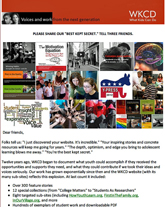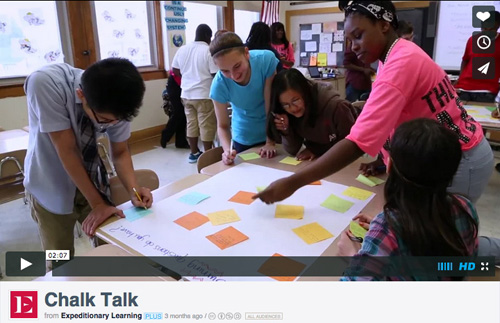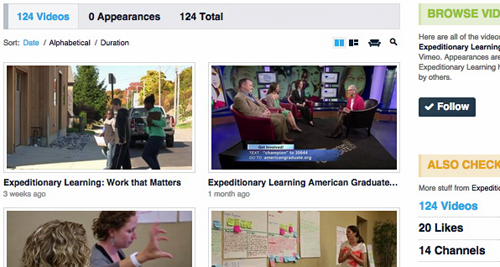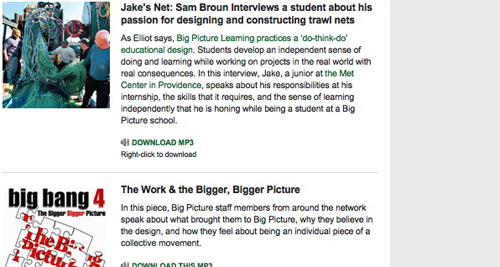 There's a radical - and wonderful - new idea here . . . that all children could and should be inventors of their own theories, critics of other people's ideas, analyzers of evidence, and makers of their own personal marks on the world." - Deborah Meier, Educator There's a radical - and wonderful - new idea here . . . that all children could and should be inventors of their own theories, critics of other people's ideas, analyzers of evidence, and makers of their own personal marks on the world." - Deborah Meier, Educator

SUBSCRIBE TO OUR NEWS BLAST
OTHER WKCD WEBSITES
First In The Family
Fires In The Mind
How Youth Learn
Social-Emotional Learning
Next Generation Press
Center for Youth Voice
In Our Village
Life in New China
SPECIAL COLLECTIONS
Advice for Parents
Student/Youth Voice
College Matters
Global Youth Voices
Just Listen!
Mentors That Matter
Service Learning
Students as Allies in School
Reform
Student Research for Action
Voices from the Middle Grades
Youth in Policy: Civics2
Youth on the Trail 2012
POPULAR WKCD PUBLICATIONS (PDFS]
A Guide to Creating Teen-
Adult Public Forums
Cultural Conversations through Creative Writing
Documenting Immigration Stories
First Ask, Then Listen: How Your Students Can Help You Teach Them Better
Making Writing Essential to
Teen Lives
Profiles of Politically Active Youth
Queer Youth Advice for Educators
SAT Bronx
The Schools We Need: Creating Small High Schools That Work for Us
| Deeper Learning Videos and Podcasts
from WKCD| NOVEMBER 13, 2014

Imagine that you walk into an eighth-grade classroom. A small group of students is cheering. They’ve just discovered that the wind turbine they designed and built can produce almost six volts of electricity. One of the students tells you that she had to redesign the blades several times, but that she persevered. Why? She was inspired by a book she read in English class about a man in Malawi who built a wind turbine out of scrap metal to bring electricity to his village. Another student shows you a map she made in social studies class. She points to the areas where wind turbines could be built in her state. And she proudly presents her persuasive essay, which explains the value of wind turbines.
These students are engaged in deeper learning—which means they are using their knowledge and skills in a way that prepares them for real life. They are mastering core academic content, like reading, writing, math, and science, while learning how to think critically, collaborate, communicate effectively, direct their own learning, and believe in themselves (known as an “academic mindset”).- Hewlett Foundation
Student-centered learning. Social-emotional learning. Deeper learning. They are all woven from the same cloth. For several years, the William and Flora
Hewlett Foundation has sponsored the Deeper Learning Network (DLN), a set of school networks comprising over 500 schools in 41 states. In these schools students embrace academic mindsets and self-directed learning--establishing their own goals, adapting to new circumstances, accepting feedback, and persevering.
Here we share links to videso and podcasts that explore daily practice by schools within the Deeper Learning Network. The Hewlett Foundation website also includes a collection of videos in which principals, teachers, and students talk about how their teaching and learning has changed.
 |
Teaching Channel's Deeper Learning Video Series
The 50 plus videos in this series showcase ten Deeper Learning networks that collectively serve more than 500 schools and 227,000 students.They illustrate
innovative teaching models that emphasize real-world experience, academic mindsets, and collaborative project work. |
 |
Expeditionary Learning Videos
The Expeditionary Learning (EL) network, with 165 schools, has championed project-based, deeper learning for more than two decades. These videos share EL's strategies for student-engaged assessment (e.g., checking for understanding, using data with students, student-led conferences, passage presentations with portfolios) and deeper instruction (e.g., literacy, inspiring excellence, differentiation, math).
|
 |
Big Picture Podcasts
The Big Picture Learning (BPL) network currently includes 70 small schools that combine personalized learning with real world experience. In these podcasts, BPL staff and students talk about the power of relevance, rigor, tacit knowledge, school culture, leadership, and BPL’s cornerstone belief—that learning happens best when students pursue their passions.
See also Big Picture's YouTube channel |
What Kids Can Do, Inc. | info@whatkidscando.org | www.whatkidscando.org
Copyright © 2015 What Kids Can Do, Inc.
|






